![]()
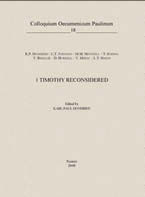 |
1 Timothy Reconsidered contains the presentations and deliberations of the nineteenth meeting of the Colloquium Oecumenicum Paulinum. Extensive dialogue centered on the methodological issue of pseudonymity and its continued effectiveness as an exegetical tool. Some urged consideration of a broader view of Pauline letter writing, one that involved authorization to, or joint authorship with, co-workers situated in diverse Pauline missionary centers. The volume also contains a major reassessment of theological themes found in 1 Timothy. |
|
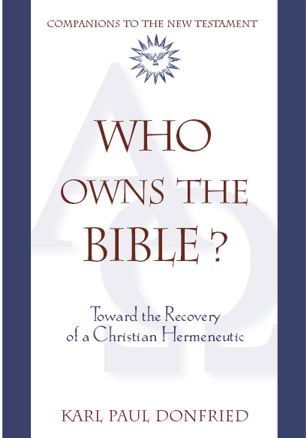 |
A provocative volume that sorts out the current controversies in biblical interpretation. It is argued that both the religious right and the religious left have misappropriated the Christian Bible into domains of meaning
that are alien to the intention of the early Christian church, the original shapers of the canon of Scripture.
By recovering the primary Trinitarian context for the interpretation of Scripture, a wide variety of current neuralgic issues are
engaged, inlcuding sexuality and the moral life. |
|
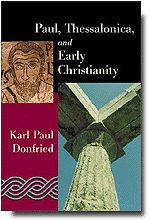 |
This significant book contains essays on Pauline thought and theology
that span some twenty-five years, placing themes and issues in a broad
chronological context of academic discussion. In addition to discussing
major Pauline themes, and 1 Thessalonians in its religious and cultural
context in particular, Karl Donfried raises the question of Paul's Jewishness
with a fresh urgency and opens new perspectives on the origins of early
Christianity and its relationship to Second Temple Judaism. |
|
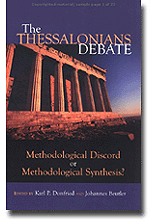 |
The
renewed interest in 1 Thessalonians over the past two decades has been
extraordinary. While exegetical labors have been immense, little consensus
has been reached with regard to the purpose and intention of this, Paul's
first letter and the earliest extant Christian document. This new volume
is meant to introduce readers to the scope and nature of the current debate
on 1 Thessalonians. Written by several of today's top scholars of 1 Thessalonians,
these important essays explore the difficult exegetical challenges that
1 Thessalonians presents to contemporary readers and illustrates the diverse
methodological approaches presently being used to interpret this important
New Testament letter. |
|
Rome, as the center of the first-century world, was home to numerous ethnic groups, among which were both Jews and Christians. The dealings of the Roman government with these two groups, and their dealings with each other, are the focus of this engaging book.
|
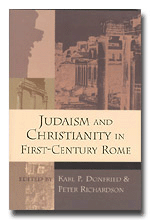 |
THE
DYNAMIC WORD clearly and perceptively explores the religious, sociological,
and cultural forces that shaped early Christian communities and the writings
known as the New Testament that were addressed to them. Professor Donfried
summarizes many of the major developments of the last fifty years of New
Testament scholarship, while offering the thoughtful pastor, layperson,
and student important new insights into the meaning of being faithful
to the Bible today. |
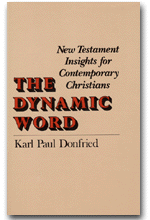 |
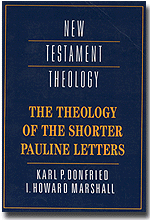 |
This
book breaks new ground in offering an exposition of the theological message
of the shorter Pauline letters. Professor Donfried expounds the theology
of 1 and 2 Thessalonians, examining the cultural setting of these letters
and the particular milieu in which their distinctive themes took shape.
He shows that the notion of election is a key theme in the Thessalonian
correspondence, while both letters have important things to say to people
in our own day about Christ, about forgiveness, and about a sanctifying
God who pours out his Spirit. |
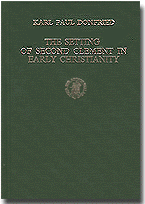 |
This
book is the first major and comprehensive reevaluation of the significant
early Christian document known as 2 Clement since the studies of Lightfoot,
Harnack and Windisch. By emphasizing such methodological advances as form
and redaction criticism, Professor Donfried sheds valuable new light upon
the setting, genre, purpose and theology of 2 Clement. Because 2 Clement
is dated in the late first century A.D., in close proximity with the situation
calling forth 1 Clement, this monograph has important implications not
only for the study of the gospels but also for the wider New Testament
canon and early Christian literature in general. |
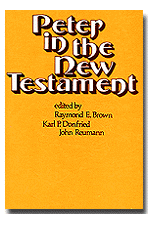 |
The role of Peter has remained one of the most sensitive and divisive areas of New Testament inquiry, particularly because of its implications for the position of the papacy in Christendom. This study, which moves the discussion beyond many old impasses, has biblical, theological, and ecumenical implications for all Christian churches. The status of this book as an ecumenical achievement of American biblical scholarship is attested to by the welcome it received and by its translations into five foreign languages. |
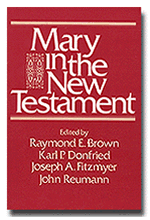 |
The role that Mary plays in God's plan of salvation is an issue that over the centuries has divided Christians and their churches. In part, these differences stem from disagreements about what the New Testament says with regard to the mother of Jesus. This book goes a long way toward solving the disputes. It is not a collection of essays but rather a collaborative statement prepared by a team of Protestant, Anglican, and Roman Catholic scholars who have reached substantial agreement on how Mary was pictured by Christians of the first two centuries. |